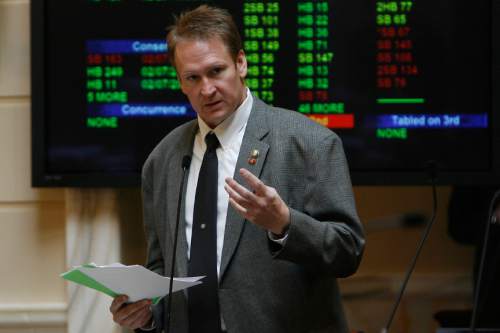This is an archived article that was published on sltrib.com in 2015, and information in the article may be outdated. It is provided only for personal research purposes and may not be reprinted.
The Utah Senate sponsor of a bill that would legalize medical marijuana — who acknowledges having sampled cannabis on a recent trip to Colorado — says the biggest challenge to his bill will be overcoming opposition from the "super-bigoted hater group."
"I've had a very strong emotional knee-jerk type of reaction from a lot of folks. I think we need to push past that emotion and push past much of the propaganda that's been promulgated for a number of years," said Sen. Mark Madsen, R-Saratoga Springs. ' "Reefer Madness' is neither medical research nor public policy, it's propaganda, and we can't be basing our policy on propaganda."
Madsen, who said he has tried numerous pain medications for lingering back pain and, on the advice of a doctor, drove to Colorado two weekends ago and tried a gummy product and vaporizer pen with tetrahydrocannabinol, or THC, the active ingredient in marijuana.
"It's effective. It has effective properties," he said, although it wasn't as powerful as he expected. If his doctor thought it would be helpful, Madsen said, he would use it again.
Madsen's bill, SB259, would establish a network of marijuana greenhouses and medical dispensaries, all licensed by the state — the first time such a plan has been proposed in Utah.
Businesses could register with the Utah Tax Commission and apply for licenses to grow cannabis under the supervision of the state Division of Occupational and Professional Licensing.
Individuals with a list of illnesses could buy and use small amounts — not more than 2 ounces at a time — of THC-containing cannabis oils, lozenges and edibles containing THC. There would be a $25 fee to obtain a registration card from the state.
The plants would have to be tracked electronically — from planting to consumption — and tested by a certified, independent laboratory.
Applicants would have to pay a $5,000 fee to obtain a license to grow or sell marijuana. There could be one licensed facility for every 200,000 residents in a county — so as many as five could operate in Salt Lake County.
The bill is scheduled for a public hearing — in the Madsen-led Senate Judiciary Committee — Thursday morning.
Madsen said he is confident he has the votes to get the bill through the Senate and optimistic it can pass the House.
He said that his measure would have no impact on recreational use of marijuana and, when speaking to his colleagues, he uses the same logic that he applies to the debate about gun laws.
"Only the law-abiding are constrained in their choices by laws. People who break the law and use it recreationally and break the law are not going to be affected by this bill one way or the other," Madsen said. "We have people who are suffering, and the government policy is denying them relief based on the possibility or the reality that some people [might] abuse."
Twenty-three states — including neighboring Nevada, Arizona and Colorado — and the District of Columbia have legal medical marijuana.
Madsen's bill will face an uphill battle, not solely because of Utah's conservative, anti-drug Legislature, but because of opposition from Gov. Gary Herbert, who has expressed concerns that legal marijuana for medical purposes would lead to a slippery slope to recreational use of the drug.
"I mean, it's a sham," Herbert said. "It's not just being used for medical uses, it's being used for recreational purposes."
Twitter: @RobertGehrke



